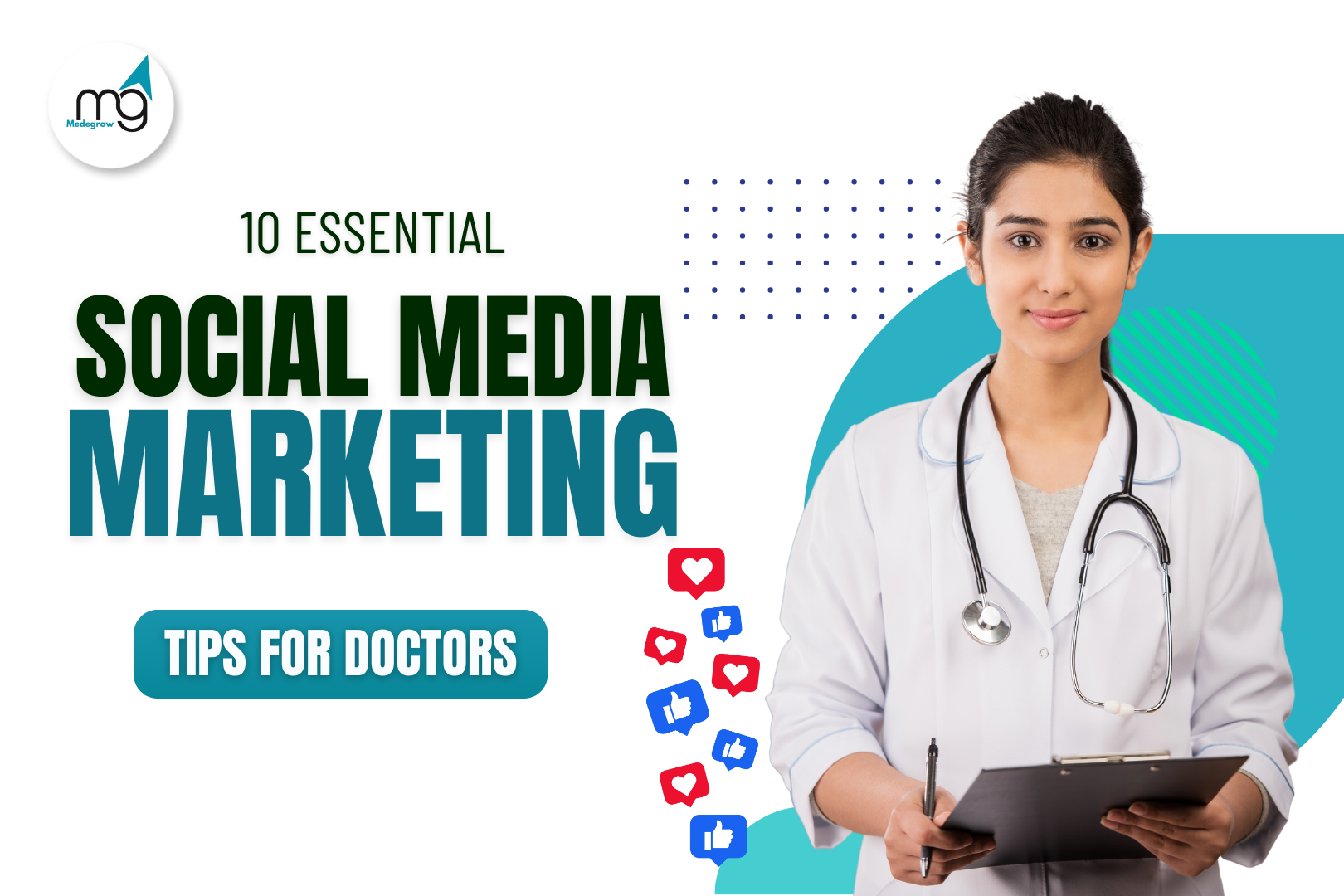
Why Social Media Matters for Doctors
In today’s digital age, social media has transformed the way healthcare is delivered and experienced. As patients increasingly turn to the internet for medical information, social media tips for doctors have become essential for effectively connecting with audiences, building credibility, and promoting healthier lifestyles.
By leveraging social media effectively, physicians can educate patients about medical conditions, share health tips, and establish a strong online presence that reflects their expertise.

Social media not only serves as a platform for patient education but also as a vital component of reputation management. In this article, we will explore actionable social media tips for doctors to enhance their online presence while fostering trust among patients.
Understanding the Role of Social Media in Healthcare for Doctors
Social media has revolutionized the healthcare landscape by providing patients with immediate access to a wealth of medical information. Patients are no longer passive recipients of healthcare; they actively seek out information about their health, treatments, and healthcare providers online.
As such, following social media tips for doctors is crucial for maintaining a professional yet engaging online presence.
A strong social media presence allows doctors to raise awareness about various medical conditions, debunk common myths, and build trust with their patients.
By following social media tips for doctors sharing accurate information and engaging content, physicians can position themselves as reliable sources of information, encouraging patients to make informed health decisions.

Choosing the Right Platforms for Medical Professionals
Selecting the right social media platforms is essential for maximizing engagement and outreach. Following social media tips for doctors can help medical professionals choose the most effective platforms to connect with their audience. Here’s a breakdown of the most impactful platforms for medical professionals:
- Twitter (X)
- YouTube
Facebook is an ideal platform for community outreach, allowing doctors to share educational posts, engage with patients, and participate in local health initiatives. Its diverse user base makes it a valuable tool for connecting with a wide range of demographics.
Instagram is perfect for visual storytelling. Doctors can share clinic updates, health tips, and behind-the-scenes glimpses of their practice through engaging photos and videos. Reels and Stories are particularly effective for delivering quick health tips or promoting events.

Twitter (X)
Twitter excels in providing quick updates and participating in real-time healthcare discussions. Physicians can use this platform to share news articles, comment on health trends, or engage in conversations with other healthcare professionals.
Also, read our another blog on Online Presence for Doctors – find out how to strengthen your digital footprint and connect with more patients!
LinkedIn is invaluable for networking with fellow healthcare professionals and joining medical communities. Doctors can showcase their expertise, connect with peers, and share professional achievements.
YouTube
YouTube is the best platform for creating educational videos, webinars, and Q&A sessions. Doctors can explain complex medical topics in a more relatable manner, reaching a broader audience through engaging video content.
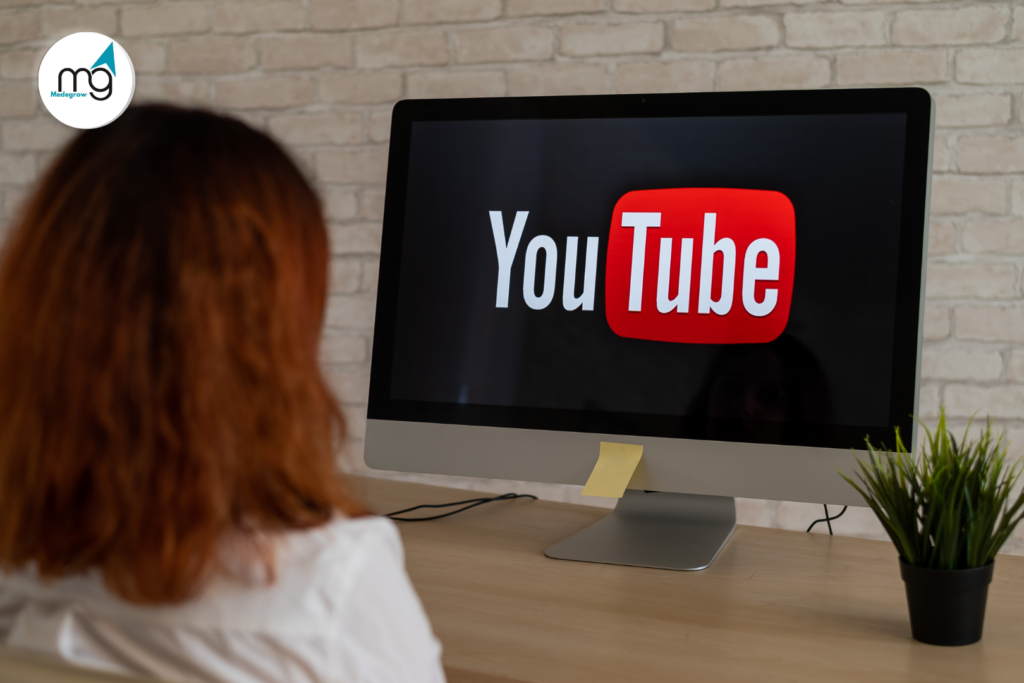
Social Media Tips for Doctors: Best Practices for Success
To build a successful social media presence, doctors should follow these best practices, incorporating social media tips for doctors. This includes creating a clear brand identity that reflects their professional values and expertise.
Engaging content is crucial; physicians should share informative posts, health tips, and personal stories that resonate with their audience. Regular interaction with followers through comments and direct messages fosters community and trust.
By maintaining a professional yet relatable tone and leveraging these social media tips for doctors, physicians can effectively connect with patients and establish themselves as credible sources of information within their communities.
- Stay Consistent with Posting
- Create Educational Content
- Share Patient Success Stories (With Permission)
- Engage with Your Audience
- Maintain Professionalism and Privacy
Stay Consistent with Posting
Establishing a regular posting schedule helps maintain an active online presence. Aim to post at least 2-3 times a week. Using social media management tools like Buffer or Hootsuite can streamline this process by automating posts and saving time.
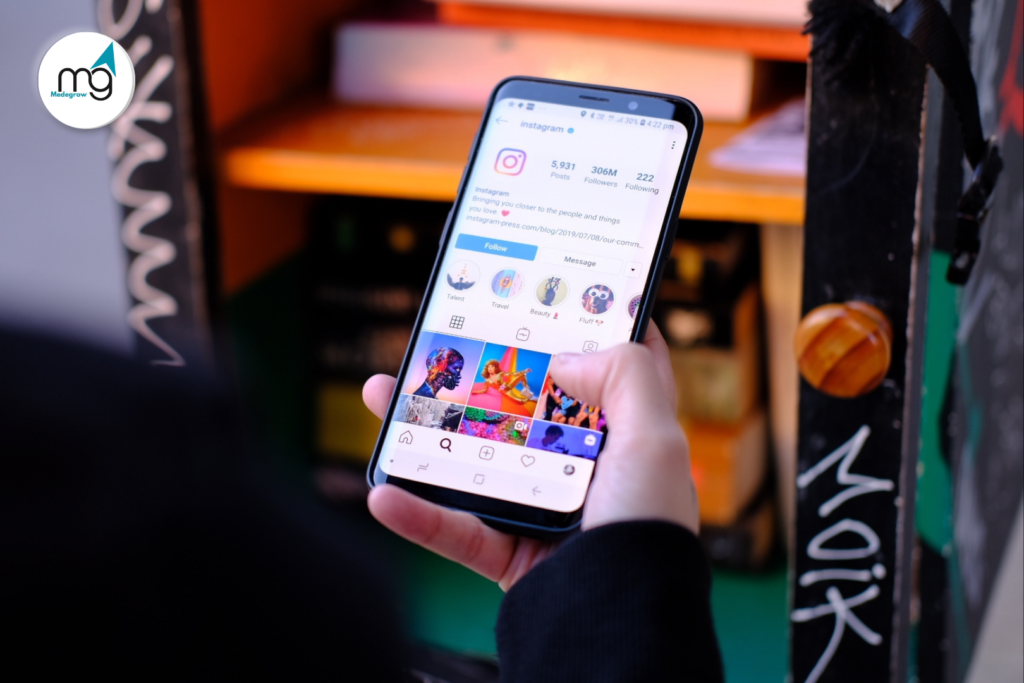
Create Educational Content
Focus on providing valuable information about common health issues, preventive care, and seasonal tips. Simplify complex medical jargon into easy-to-understand language, making it accessible for all patients.
Share Patient Success Stories (With Permission)
Sharing testimonials can build trust and showcase treatment outcomes. Always obtain patient consent before sharing any details or photos to maintain ethical standards and patient confidentiality.
Engage with Your Audience
Interacting with patients helps foster a sense of community and is a vital aspect of social media tips for doctors. Responding to inquiries and comments promptly shows that physicians value their patients’ input and care about their concerns. Encouraging patients to ask questions or participate in health campaigns not only promotes engagement but also creates a supportive environment.

Maintain Professionalism and Privacy
It’s essential to uphold professionalism in all interactions by following social media tips for doctors. Avoid sharing patient information without permission, and maintain a balance between personal anecdotes and professional insights. Adhering to privacy regulations such as HIPAA is crucial in all communications.
How Social Media Can Improve the Doctor-Patient Relationship
Social media can significantly enhance the doctor-patient relationship in various ways, especially when physicians utilize social media tips for doctors:
- Accessibility: Patients feel more connected when they can engage with doctors online. This accessibility allows patients to reach out with questions or concerns more comfortably.
- Trust Building: Regular posting helps create familiarity and trust, making patients feel more at ease with their healthcare provider.
- Patient Education: By following social media tips for doctors and providing accurate medical information, doctors can reduce the spread of misinformation and empower patients to make informed decisions about their health.
- Increased Patient Retention: Engaged patients are more likely to return for follow-up appointments and recommend the practice to others, contributing to long-term success.
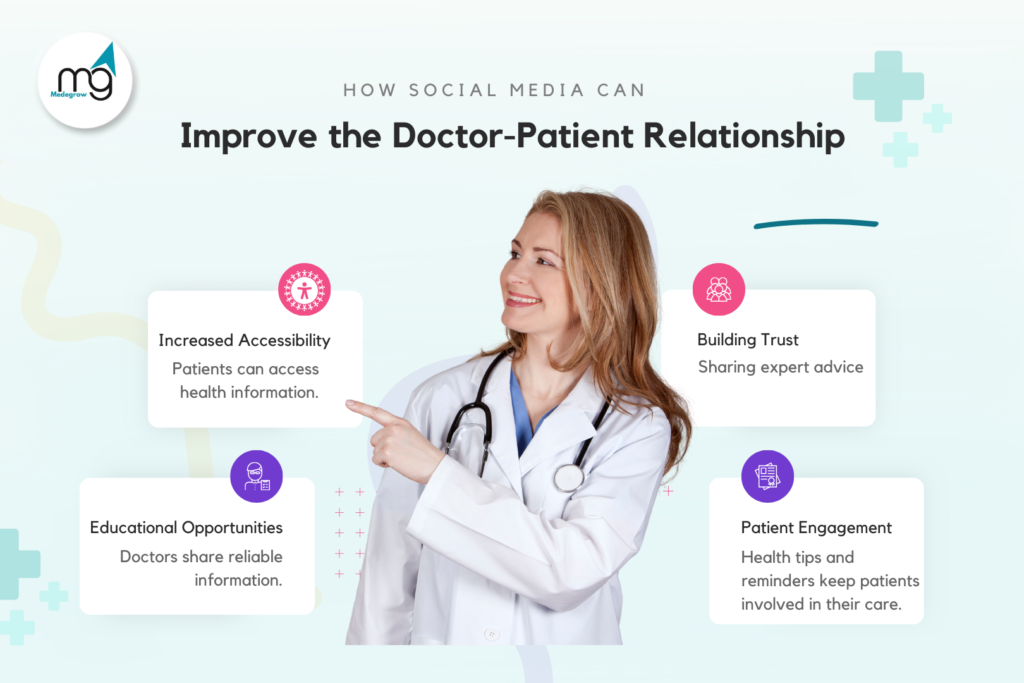
Avoiding Common Social Media Pitfalls for Doctors
While social media offers numerous benefits, it also comes with potential pitfalls. Here are some common mistakes to avoid:
- Overposting or Undermining Professionalism: Striking a balance is essential. Posting too frequently or in an overly casual manner may undermine professionalism and reduce credibility.
- Ignoring Negative Feedback: Respond to criticism politely and offer to resolve issues privately. Engaging with negative feedback can demonstrate a commitment to patient satisfaction.
- Lack of Engagement: Simply posting content without interacting may limit patient trust. Encourage discussion and respond to comments to foster a more engaged community.
- Privacy Violations: Be vigilant about protecting patient data. Ensure compliance with HIPAA and other regulations to avoid legal repercussions.
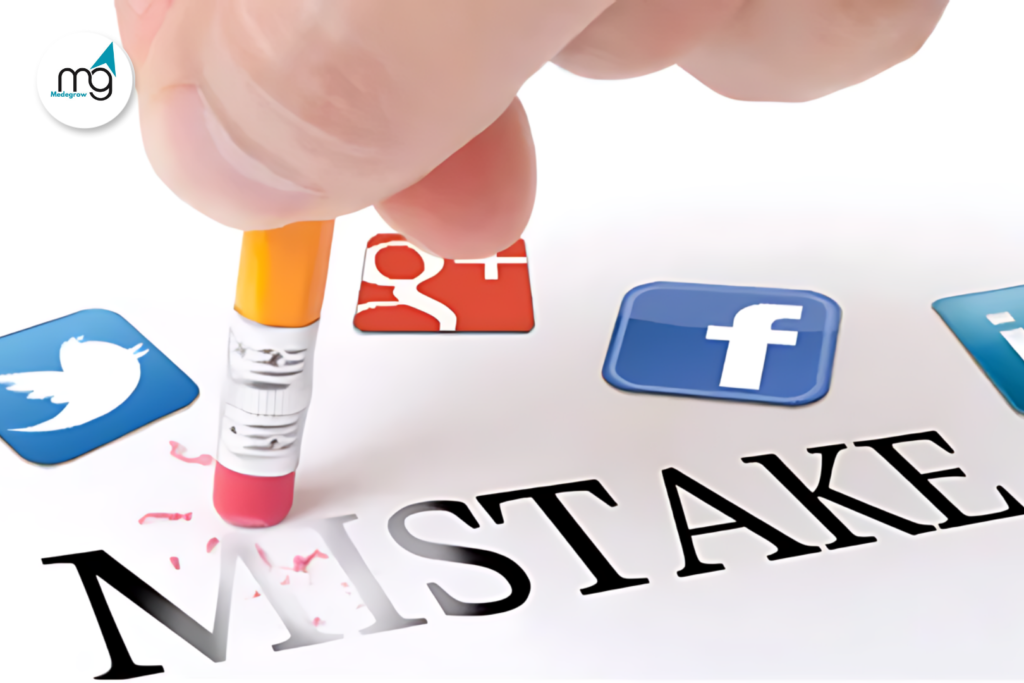
Content Ideas for Doctors to Post on Social Media
Here are some engaging content ideas to inspire doctors, incorporating social media tips for doctors:
- Health Awareness Campaigns: Participate in global health days like World Heart Day or Breast Cancer Awareness Month by sharing informative posts and resources.
- Tips and Remedies: Offer seasonal health advice, such as flu season tips or allergy management strategies.
- Behind-the-Scenes Content: Showcase your practice by introducing your team and highlighting the services you offer. This personal touch can enhance patient trust.
- Myth-Busting Posts: Dispel common medical myths and provide accurate information. This helps establish you as a credible source of medical knowledge.
- Polls and Q&As: Engage your audience by asking for their opinions or answering common medical questions in a fun, interactive way.
The Role of Paid Advertising on Social Media for Doctors
Investing in paid advertising can significantly enhance a doctor’s online visibility and expand their reach to potential patients. By applying social media tips for doctors, healthcare professionals can create targeted ad campaigns that effectively promote their services.
One effective strategy is to identify the target audience based on demographics, interests, and location. This ensures that the advertisements reach individuals who are most likely to need medical services.

Also, read our another blog on Benefits of Digital Marketing for Healthcare – discover how digital strategies can transform your practice and enhance patient engagement!
Utilizing eye-catching visuals and compelling ad copy is essential; clear and engaging content can capture attention and encourage potential patients to learn more.
- Boosting Visibility: Promote posts about new treatments, services, or health events to attract more patients.
- Local Targeting: Use geo-targeted ads to reach patients in your area, making your services more accessible to the local community.
- Appointment Booking Campaigns: Drive traffic to your online scheduling platforms with ads that encourage patients to book appointments directly.
Tools and Resources to Simplify Social Media for Doctors
To streamline social media management, doctors can utilize various tools:
- Content Scheduling Tools: Platforms like Buffer or Hootsuite allow you to schedule and automate posts across different social media accounts.
- Graphic Design Tools: Tools like Canva enable you to create professional-looking visuals without needing extensive design skills.
- Analytics Tools: Use Meta Insights and Google Analytics to track engagement and performance metrics, helping you refine your content strategy.
- Healthcare Compliance Tools: Ensure your posts are HIPAA-compliant and adhere to regulatory guidelines to protect patient privacy.

Leverage Social Media to Connect and Grow Your Practice
In summary, social media offers a powerful opportunity for doctors to enhance patient trust, promote health education, and grow their practices.
By following social media tips for doctors and staying consistent, professional, and interactive with their audience, physicians can cultivate a thriving online presence that fosters meaningful connections with patients.
The digital landscape continues to evolve, and healthcare professionals must adapt to these changes. By embracing social media tips for doctors as a tool for communication and education, doctors can make a significant impact on their patients’ lives and their practices.
FAQs on Social Media Tips for Doctors
How often should doctors post on social media?
Posting at least 2-3 times a week keeps your audience engaged without overwhelming them.
Can doctors respond to medical questions on social media?
Yes, but only offer general advice. For specific medical concerns, advise patients to consult in person.
What kind of photos can doctors share on social media?
Clinic photos, team introductions, or educational images are great options. Avoid sharing any patient-related images without explicit permission.
Should doctors use paid advertising on social media?
Yes, paid ads can help attract new patients, promote services, and boost visibility locally.
How can doctors protect patient privacy on social media?
Use HIPAA-compliant platforms and never share personal patient information online.


